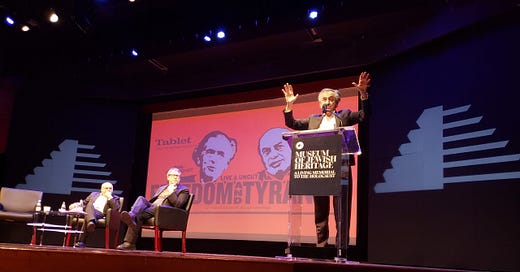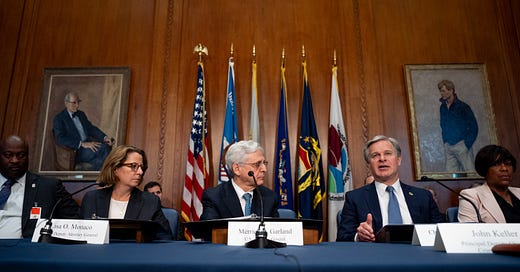
Hope for Ukraine, Hope for the West, Hope for Democracy
A conversation with Natan Sharansky and Bernard-Henri Lévy.
On Sunday afternoon in lower Manhattan, the now-familiar call Slava Ukraini!—Glory to Ukraine!—sounded in a packed auditorium of the Museum of Jewish Heritage—a location whose very nature, in a sense, challenges the propaganda tropes Vladimir Putin’s regime has used to justify its war against alleged “Nazis” in Ukraine. The museum, and the Jewish magazine Tablet, hosted an extraordinary conversation about Ukraine and the future of freedom between two towering figures associated with freedom’s cause in the twentieth and twenty-first centuries: Natan Sharansky, the ex-Soviet Jewish human rights activist who spent nine years in Soviet prison camps for championing the right to emigrate to Israel, and Bernard-Henri Lévy, the French intellectual and globetrotting public activist who has made various battles against tyranny and barbarism—in the former Yugoslavia, in Kurdistan, and now in Ukraine—his personal cause. Slava Ukraini! happens to be the title of Lévy’s just-completed documentary, the sequel to last year’s Why Ukraine? (which I wrote about in these pages). Sharansky has his own personal connection to the current events in Ukraine: he was born in Donetsk, the hub of the Kremlin-sponsored “insurgency” in Ukraine that served as the prelude to the current war.
The conversation included some excursions into history when Sharansky recalled growing up with the Soviet fiction that ethnic, cultural, and geographic identities were irrelevant (many Soviet Jews, he noted, initially couldn’t understand why Ukrainians complained about the suppression of Ukrainian identity and culture, since unlike Jews Ukrainians encountered no identity-based discrimination in Soviet society) and spoke of President George H.W. Bush’s well-meaning but ill-conceived opposition to Ukrainian independence in 1991. But mostly, the focus was on the present day: the war in Ukraine in the larger global context of the battle for freedom.
Lévy, who is relatively fresh from the World War I-like hellscape of Bakhmut, spoke with particular passion. He noted that Clausewitz, the great military theorist, made a distinction between “interstate war” over territory or other national interests which may be right or wrong, and “absolute war” in which not only practical interests but essential values are at stake; the war in Ukraine, Lévy said, was “one of the most perfect examples” of absolute war, since Putin’s invasion was about more than merely restoring the old Russo-Soviet empire: “He really launched this war because he thinks that democracy is a calamity, that democracy is a disaster, that democracy at his borders is a plague which can only contaminate his country.” Here, Lévy also made a brilliantly insightful and concise observation about the supremely corrupt essence of the Kremlin’s “anti-Nazi” rhetoric: “When Putin says de-Nazification, what he means is de-democratization, by a horrible twist of the language.”
Just as he did in the film Why Ukraine?, Lévy repeatedly stressed that Ukraine is fighting for the values of the free world:
The Ukrainian soldiers defend their family, they defend their land but all those whom I had the chance and the privilege to interview—really, all of them—told me [they] also are defending, values of democracy . . . a certain conception of government and the values of Europe. And really, when you hear that once, twice, three times, it can be words, words, words; when you hear that everywhere, from sophisticated intellectuals at war to simple citizens . . . it means something.
Lévy also spoke of the contrast between Putin’s army of war criminals and the Ukrainian Armed Forces with their strong commitment to minimizing harm to civilians. He said he found that difference especially striking while chronicling the liberation of Kherson in his upcoming film. One could quibble and cite instances of apparent abuse by Ukrainian soldiers; but, as Lévy himself noted, “there are no angels,” especially in war. The overall pattern he describes is clearly real; the grisly presence of the “Wagner Group” mercenaries on the Russian side—and their latest snuff videos of an accused traitor’s apparent sledgehammer execution—makes this point more forcefully than anything Lévy could say.
Lévy stressed, as well, that the values Ukraine is defending are also closely related to America’s creed; but he noted that there are other good reasons Ukraine’s battle is also America’s battle—such as deterring China’s invasion of Taiwan, which he believes was a “serious project” in the works in Beijing a year ago. The war in Ukraine, he said, has already moved this project back considerably. “If Russia is defeated, as I hope with all my heart and as I pray every morning,” Lévy added, “the project [is] delayed for long, for very long. So again, it is in the interest of our countries to see the victory of Ukraine and not only the defeat [but] the capitulation of Putin and of Russia.”
Although both Sharansky and Lévy expressed admiration for Ukraine’s pro-Western quest, they also leveled some pointed criticism at the West—not only for being slow with weapons deliveries today, but for enabling Putin for the last two decades. Had the West been stronger in its response to Russia after the 2008 invasion of Georgia, Sharansky argued, there would have been no aggression in Ukraine:
Georgia was the first serious attempt after Chechnya [by] Putin to start [to] rebuild the empire, and [when] Georgia gave a unbelievable resistance, a small country—nothing. . . . Putin got 20 percent of its territory and the world accepted. So I think no doubt there was a big encouragement for Putin.
He also faulted President Obama for the unenforced “red line” for Bashar Assad’s regime use of chemical weapons in Syria—a “moment of big weakness” which resulted in Russia’s dominant military presence in that country and, eventually, in the Russian seizure of Crimea in 2014. (Sharansky also argued that Israel’s refusal to provide military assistance to Ukraine, which he admitted he found frustrating, was in large measure caused by the pragmatic realities of Russian control of Syrian airspace.)
I asked Sharansky how he would evaluate, in retrospect, the assessment he offered in his 2004 book, The Case for Democracy, in which he described the then-recent rollbacks of freedom under Putin as “bumps on Russia’s road to democracy” and asserted that the preference for freedom over tyranny is an essential part of human nature. In response, Sharansky voiced his profound disappointment at “how far back Putin took Russia”—most recently causing it, he said, to slide back not only to Leonid Brezhnev’s Soviet Union but in the direction of the Stalin regime.
Yet Sharansky also pointed out that “millions” of Russians were resisting in one way or another, whether by fleeing abroad, protesting, or taking part in internet discussions critical of the regime. His comments were, in a sense, a refreshing pushback against the stereotypes of inherent Russian servility that frequently rear their head in Russia discourse these days. Yet one may fairly wonder at the same time whether Sharansky’s optimism is too idealistic. (The inherent human desire for freedom may well be real, but so are some other, less freedom-friendly and deep-seated human impulses.) Sharansky also reasonably pointed out that many Western countries traveled their own long and hard road to freedom and civil society; people may prefer a life without fear, doublethink, and self-censorship when given a choice, but “whether their society is ready to build . . . institutions which protect these freedoms, that’s another question; sometimes the road can be very long.”
Lévy styled himself a pessimist, but also ventured that right now he was optimistic because of three things: (1) Ukrainian president Volodymyr Zelensky, “a comedian whom everybody saw as a sort of populist without real charisma” and who was reborn overnight as “a Churchillian and Jewish hero”; (2) the Ukrainian people and their collective heroism; and, finally, (3) Joe Biden. “What happened to your president is a sort of miracle and a miracle always make you [an] optimist,” Lévy said, noting that at the start of the war Biden was widely seen as someone who was not only getting old and feeble but encumbered with the legacy of an overcautious and accommodating foreign policy which had led to the fiasco in Afghanistan. Then, “all of a sudden this man acted as a strong, brave, true great American president, and he decided overnight to support [Ukraine], to deliver all the weapons.”
Given the venue, the question of Ukraine, Jews, and antisemitism inevitably came up more than once. Sharansky noted that Ukraine was not only fighting for freedom but restoring nationalism’s good name, in the sense of defending national independence and pursuing liberation from tyranny. That, Sharansky pointed out wryly, “is something Israelis need”: Amid a growing skepticism of the need for a Jewish democratic state, “suddenly everybody loves Ukraine, and the Ukrainian says: We want to be a Ukrainian democratic state.” As for the question of Ukraine’s troubling legacy of antisemitism, both Lévy and Sharansky noted that Ukraine—unlike Russia—had come a long way toward acknowledging historical crimes in its past. Here, too, Sharansky’s caustic humor provided a dose of refreshing realism: After briefly surveying the past legacies of antisemitism in today’s liberal democracies such as Switzerland, Spain and France, he noted that “if we Jews start building our [relationships] on the basis of what they did to us, we should move to other planets.”
On a day when the latest news strongly suggested that Russia’s fearfully anticipated new offensive in Eastern Ukraine was already running into the same old problems of poorly trained and unmotivated soldiers, shoddy equipment, and shabby decision-making, I came out of the event at the museum with my optimism renewed. Reducing human conflicts to battles between good and evil is always a risky proposition. But this “absolute war” of values comes as close to a clash of imperfect good and ever-darker evil as anything in the 75 years. Will it end in a true capitulation of tyranny? Maybe not; but both Lévy and Sharansky made a powerful case for such a capitulation. If there was a takeaway from their conversation, it was that standing with Ukraine is not a fad du jour or a political strategy, but a true moral imperative.











